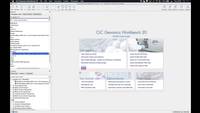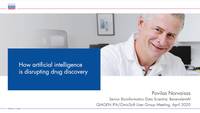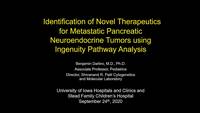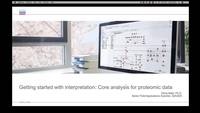Discovery and Research User Group Meetings +
May 2020 CLC UGM - 6.Understanding host-microbe interactions in oncology and applications in the provision of personalized supportive care - Hannah Wardill
369 views
Dr Hannah Wardill is a dynamic early career fellow with an interest in oncogastroenterology and its relevance to supportive cancer care. After completing her PhD at the University of Adelaide, Hannah secured an NHMRC CJ Martin Biomedical training fellowship allowing her to relocate to the University of Groningen, the Netherlands. Here she led a program of research dedicated to understanding how the microbiota contributes to chemotherapy-induced diarrhea and blood stream infection in both paediatric and adult cancers. Hannah has recently returned back to Australia and teamed up with the country’s leading stool bank to develop innovative methods of exploiting the microbiota to predict and prevent some of the most serious side effects of cancer therapy. In recognition of her contribution to the field of supportive cancer care, Hannah has been awarded the Multinational Association for Supportive Care in Cancer International Young Investigator Award, was named the South Australian Young Achiever and the Qiagen Microbiome Award winner.
From the Speaker, Hannah Wardill, PhD: The number of people now surviving their cancer diagnosis is rapidly increasing reflecting advances in our understanding of cancer aetiology and increasingly sophisticated treatment strategies. While encouraging, we are now faced with a growing population who are burdened by the acute and chronic complications of their treatment, posing a significant impact on patient quality of life, survivorship and financial stability. In my presentation, I will discuss three key side effects of cancer therapy that are intimately linked with the composition of the host’s microbiota: diarrhea, graft versus host disease and blood stream infection, highlighting key advances in our understanding of how the microbiota is thought to dictate the severity of these side effects, microbial interventions currently under investigation and novel methods of personalised risk evaluation. My goal is to showcase the importance of supportive care in cancer and discuss how innovative methods may be used to not only identify patients at risk of developing potentially lethal complications, but also modify their risk by fine-tuning the unique microbial communities that inhabit their gut.
Related videos
Discovery and Research User Group Meetings +
Use Case - SARS-CoV-2 analysis using CLC Genomics Workbench - CLC Microbial and Public Health...
From the Fall 2020 CLC Microbial and Public Health Genomics User Group...
Discovery and Research User Group Meetings +
IPA UGM FALL 2020 - Identification of Novel Therapeutics for Metastatic Pancreatic Neuroendocrine...
In this video, Dr. Benjamin W Darbro talks about the study they performed at...
Discovery and Research User Group Meetings +
Getting startedwith interpretation: Core analysis for proteomic data
Olivia Alder, Manager, Discovery Field Application Scientists, QIAGEN Digital...



